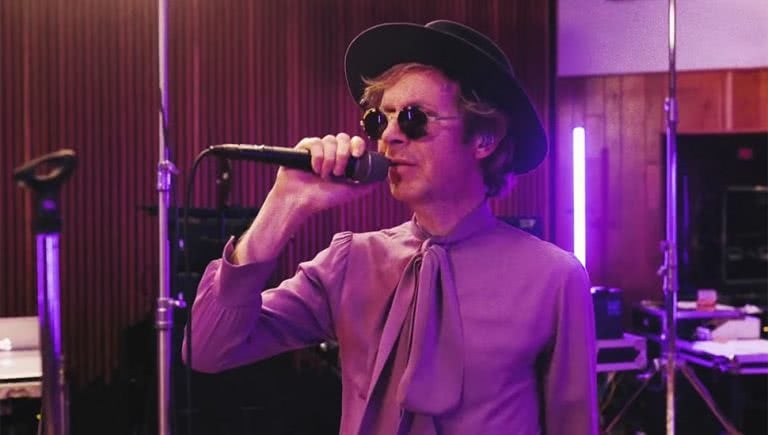Today, art rock trailblazer Beck unleashes his fourteenth studio album, Hyperspace. To celebrate, we’re reflecting on the eccentric musician’s most iconic interview moments.
Beck has outlasted the majority of the early-‘90s indie miscreant crowd for a few reasons. Firstly, being a solo artist means a breakup has never threatened to cut his career short. But more significantly, the LA musician has always sought to outdo himself from one record to the next.
Following the surprise success of his 1994 single ‘Loser’, Beck parted ways with the producers who’d helped build his profile and enlisted hip hop specialists the Dust Brothers. Best known for producing the Beastie Boys’ Paul’s Boutique, the Brothers partnered with Beck on 1996’s era-defining Odelay.
The record runs the gamut from sampledelic alternative hip hop (‘Where It’s At’) to forlorn blues numbers (‘Ramshackle’), and throughout refuses to be put in a box. This didn’t stop Odelay becoming a massive chart success, reaching the top 20 in all major territories and shifting a couple of million units.
So what did Beck do next? Call up Radiohead producer Nigel Godrich to help him create 1998’s Mutations, an album of psychedelic folk and sombre lyricism that plainly ignored the demands for an Odelay sequel.
This sort of shape-shifting irreverence permeates Beck’s entire oeuvre right up to his brand new album, Hyperspace.
Beck’s public persona has metamorphosed alongside his artistic identity
Born in Los Angeles in 1970, Beck cut his teeth in Manhattan’s late-‘80s anti-folk scene. He started gaining attention for his strange folk songs after returning to Los Angeles in the early-‘90s. Beck approached his early fame with a tongue in cheek deviance. Consider this 1994 interview with Sonic Youth’s Thurston Moore in which Beck contrives a sort of mischievous indifference.
Watch Beck being interviewed by Thurston Moore in 1994
‘Loser’ and Odelay didn’t just put Beck on the map, but made him a genuine star. The Odelay promotional tour included an interview on the Late Show with David Letterman – something not afforded to most of the show’s musical guests. Beck tones down the absurdist riffing in this appearance, but doesn’t completely let Dave off the hook.
Watch Beck being interviewed by Letterman in 1996
While his recent Australian visits have been few and far between, Beck came here a handful of times during the 1990s. He stopped by the Recovery studios during his 1998 tour for a mildly awkward chat with host Dylan Lewis. The interview showcases Beck’s knack for offering bizarre responses to bog-standard interview questions – a tack that complements his refusal to be musically pigeonholed.
Watch Beck being interviewed on Australia’s ‘Recovery’ in 1998
Beck followed Mutations with another digression, the playful Midnite Vultures. His seventh studio LP was a convincing if sometimes goofy journey into the richly textured world of ‘80s funk with a dose of ‘90s R&B sleaze. Seen here promoting the record on Canadian TV, Beck offers his two cents on the emergence of bro-centric nu metal bands like Limp Bizkit.
Watch Beck being interviewed on Much Music in 1999
Beck’s 2002 release, Sea Change, marked a major sonic maturation. Working again with Godrich, the record’s orchestral punctuation recalls the work of Serge Gainsbourg, while Beck’s forthright songwriting is akin to Nick Drake. It’s a patent breakup album, but this 2003 appearance on Late Night with Conan O’Brien shows that Beck’s sense of humour hadn’t entirely dried up.
Watch Beck being interviewed by Conan in 2003
Beck has found allies in many of the era’s most distinctive producers, from Elliott Smith collaborator Rob Schnapf to the Dust Brothers and Nigel Godrich. Riding on the success of Gnarls Barkley, Danger Mouse produced 2008’s Modern Guilt. It’s a vintage rock record that carries a paranoiac solemnity. This series of promo videos is pure farce, however, with Beck explaining that behind the title Modern Guilt is “a small man,” who “sheathes and uncovers.”
Watch Beck being interviewed for NPR’s ‘All Songs Considered’ in 2008
While 2014’s Morning Phase returned to the textures and tonality of Sea Change, the record represented the beginning of a new phase for Beck. Gone was the wilful obfuscation of his ‘90s output; he was now pitching himself as an expert craftsman. Accordingly, this Austin City Limits interview is a genuine deep dive into the album’s creation.
Watch Beck being interviewed for Austin City Limits in 2014
2017’s Colors was Beck’s first attempt at a pure pop record. Produced by Sia and Adele collaborator Greg Kurstin, the extroverted Colors provided apt stimulus for Beck’s first-rate dance moves. Although vastly different in tone, Beck’s new album Hyperspace makes a similar embrace of contemporary sounds and boasts co-production input from Pharrell Williams.
Before the release of Colors, Beck joined Zane Lowe to break down how he arrived at this point.

































